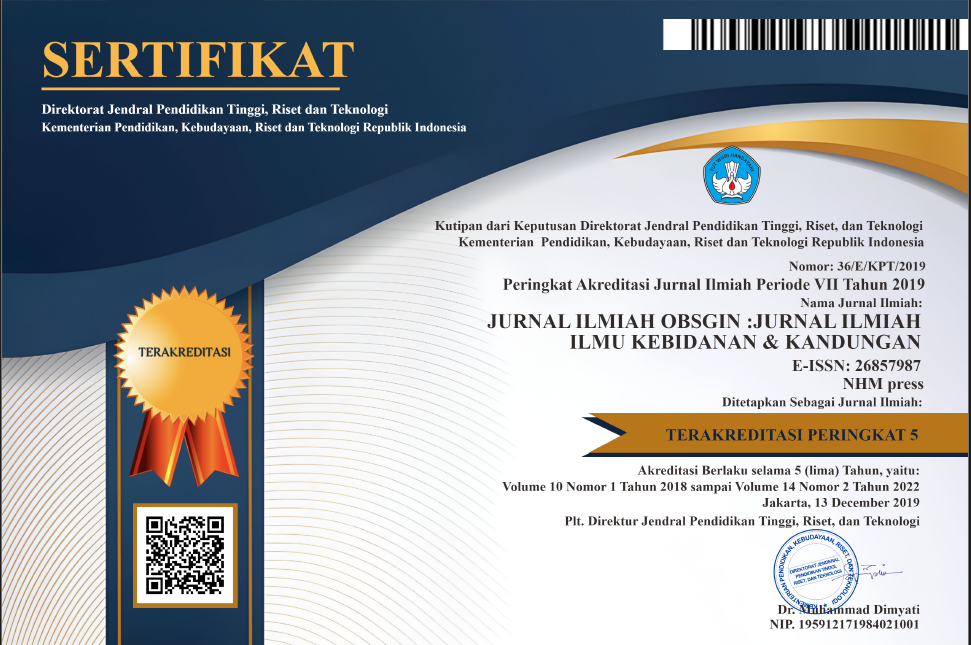HUBUNGAN KECEMASAN TERHADAP KELANCARAN PENGELUARAN ASI PADA IBU POSTPARTUM DI DESA PANDANARUM LUMAJANG
Abstract
Postpartum is the period after the birth of the baby and placenta and ends up to 6 weeks (42 days) which is marked by the cessation of bleeding. Unsmooth milk production is one of the factors that cause failure in exclusive breastfeeding. One of the triggers for breastfeeding in postpartum mothers is the anxiety they experience while breastfeeding. Meanwhile, optimal breastfeeding can increase the body's immunity and the baby's growth and development process. But not all mothers succeed in giving. The purpose of this study was to determine the correlation between anxiety and the smoothness of breastfeeding in postpartum mothers in Pandanarum Village, Lumajang. This research design uses cross-sectional. The sampling technique in this study used a total sampling of 35 postpartum mothers in Pandanarum Lumajang Village. Respondent characteristic questionnaire and Parenting Stress Index Short Form. This research uses the Kruskall-Wallis test. The results showed that the majority of postpartum mothers experienced anxiety as many as 25 respondents (71.4%). the majority of mothers have fluency in breastfeeding as many as 25 respondents (71.4%). Based on the results of the study, there was a significant relationship between anxiety and the smoothness of breastfeeding in postpartum mothers in Pandanarum Lumajang Village, namely p-value 0.020. So it can be concluded that anxiety in breastfeeding mothers can affect breast milk expenditure.
References
Erniyati,S. (2020). Hypnolactation Meningkatkan Keberhasilan Laktasi dan Pemberian ASI Eksklusif . Pustaka rumah cinta.
Hawari, R. P. (2011). Management Stress, Cemas dan Depresi. Jakarta : FK UI.
Istighosah, N., & Nurtikasari, A. (2021). Pengaruh Stress Psikologi terhadap Produksi ASI pada Ibu Post Partum. Media Informasi Kesehatan, 8(1), 1–10.
Istighosah, N., & Sari, A. N. (2022). Pengaruh Paritas dengan Kejadian Stres Psikologis Ibu Menyusui Minggu Pertama Post Partum di Masa Pandemi COVID-19. Jurnal Kebidanan, 11(1), 48–55.
Kamariyah, N. (2014). Kondisi Psikologis Mempengaruhi Produksi ASI Ibu Menyusui Di BPS Aski Pakis Sido Kumpul Surabaya
Kementrian Kesehatan Republik Indonesia. Profil Kesehatan Indonesia 2017 (Indonesia Health Profile 2017). 2017;1–184
Mardjun, Z., G. Korompis., dan S. Rompas. (2019). Hubungan Kecemasan Dengan Kelancaran Pengeluaran Asi Pada Ibu Post Partum Selama Dirawat Di Rumah Sakit Ibu Dan Anak Kasih Ibu Manado. e-journal Keperawatan (e-Kp). Vol (7). No (1)
Nursalam. (2018). Metodologi Penelitian Ilmu Keperawatan (Edisi 4). Surabaya: Salimba Medika.
Notoadmodjo, S. (2018). Metodologi Penelitian dalam Kesehatan. Jakarta: EGC.
Rahmi, J., Romlah, S. N., Ramadihina, A. R., & Sari, I. P. (2020). Pengaruh Perawatan Payudara Terhadap Kelancaran Asi Dan Tingkat Kecemasan Pada Ibu Nifas. Edu Masda, 4(1), 49–55
Rosyidah, R. (2019). Buku Ajar Mata KuliahAsuhan Kebidanan NIfas dan Menyusui. Sidoarjo: UMSIDA Press
Qiftiyah, M. (2017). Studi Tingkat Kecemasan Ibu Post Partum Terhadap Kelancara ASI Pada Ibu Nifas Hari Ke-5 (Di BPM Asri Dan Polindres Permata Bunda Tuban).











